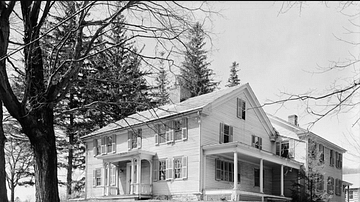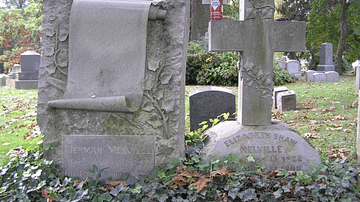
Herman Melville (1819-1891) was a 19th-century American author of novels, short stories and poetry. He is best known for his novel Moby Dick, published in 1851, and his short stories Bartleby the Scrivner and Billy Budd, Sailor. Despite his early successes as a novelist, Melville died in 1891 in relative obscurity.
Early Life
Herman Melville, the third oldest of eight children, was born on 1 August 1819 in New York City. His paternal and maternal grandfathers were both Revolutionary War heroes — a point of pride in the Melville household. His father, Allan Melvill (the "e" would be added in the 1830s) looked proudly on his family's heritage, tracing it to the Scottish Renaissance. Melville's mother, Maria Gansevoort, was of Dutch descent. The young Melville spent his youth living in luxury. His father was a dry-goods merchant who tended to live beyond his means. He alternated between enthusiasm for the future of business in America and the fear of a recession. This nagging fear caused him to borrow money from his wife's family. In 1832 Allan Melvill fell ill and died in a delirium, leaving his family heavily in debt and dependent on Maria's family for financial help.
At the age of twelve Melville left school and began working a number of menial jobs: clerking at a bank and later at his brother Gansevoort's fur-cap store. In 1837 he moved to Pittsfield, Massachusetts to run his Uncle Thomas Melville's farm. Thomas had gone west seeking greener pastures in Galena, Illinois — pastures he would never find. At the age of 18 and unemployed, Melville briefly taught in a country school near Pittsfield. The following spring he took a course in surveying and engineering at the Lansingburgh Academy in Albany, but the Panic of 1837 left him without work. Unemployed at the age of 20, and following the example of one of his cousins, he signed on as a cabin boy on a ship bound for Liverpool – an experience he would recount in his novel Redburn.
After returning home aboard the St. Lawrence, Melville again failed to find employment. Seeking further adventure, and possible employment, in June of 1840, he and his friend Eli Fly headed west to Galena where Uncle Thomas proved to be of no help. They traveled down the Mississippi to the Ohio River and then eastward back to New York. In January of 1841, at the age of 21, Melville took "desperate measures" and signed on with the Acushnet, a whaler out of New Bedford, bound for the South Seas. Melville would be gone for almost four years. It was a time that he considered as an education. It would provide him with enough experiences for four relatively successful novels and one not so successful.
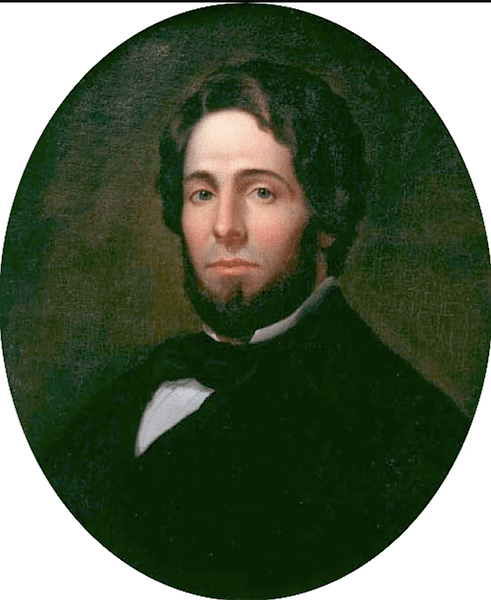
Melville Deserts Ship
After only 18 months at sea, Melville and a shipmate, Toby Greene, deserted the Acushnet at Nukuheva in the Marquesas Islands. While there, Melville lived with a local tribe, the Typee, who were reportedly cannibals. Desertion was not uncommon aboard a whaler; sometimes two-thirds of a crew would desert. Melville ultimately escaped the island on the Australian whaler the Lucy Ann. Unfortunately, after participating in another on-board mutiny, Melville was jailed by the British consul in Tahiti. After escaping and exploring the island, he next boarded a Nantucket whaler at Eimeo, the Charles and Henry. Discharged at Lahaina, Melville signed on as a seaman with a frigate in Honolulu, the United States. Having spent almost four years sailing the South Seas aboard whalers and a frigate, Melville finally arrived in Boston and was discharged in October 1844.
Melville Pens Typee
Apparently, Melville did not try to find employment this time, choosing instead to live with his two brothers in New York City. Without previous writing experience, he decided to write about his time at sea. In order to write effectively, Melville would withdraw to his room and sit alone, recalling emotions for the purpose of reliving them. The method worked since he enjoyed success with his first novel Typee (1846). To get the book published he had benefitted from a little help from his older brother Gansevoort Melville, the secretary to the American legation in London. Gansevoort was able to convince a London publisher to buy Typee. The book was well-received in America by both reviewers and the public.
Typee was quickly followed by Omoo (1847), a more polished novel. Both of Melville's novels gave the public "a romantic picture of life in the Pacific Islands." (Timko, 345). Both were well-received. Andrew Delbanco in his Melville: His World and Work wrote that Typee and Omoo were "sunny and charming" and "dappled only here and there in the shade and sorrow." (5). With the success of his first two novels and some financial security, Melville married Elizabeth Knapp Shaw in April of 1847 and moved to Manhattan. His future looked promising, but his third novel Mardi (1949) was poorly received, and considered by some to be unreadable. Undeterred and hoping to regain his earlier success, Melville sat down and penned two more novels, Redburn (1849), based on his time as a cabin boy, and White-Jacket (1850) based on his time on the frigate, the United States.
Although the early novels brought him success and recognition, this applause would be short-lived. With four relatively successful novels under his belt, Melville began to work on Moby Dick, or The Whale, as it was known in England. This monster of a novel, today considered a classic of maritime literature, was poorly received by both reviewers and the public on its release. Odd as it seems today, Moby Dick marked the beginning of the decline in Melville's popularity as an author.
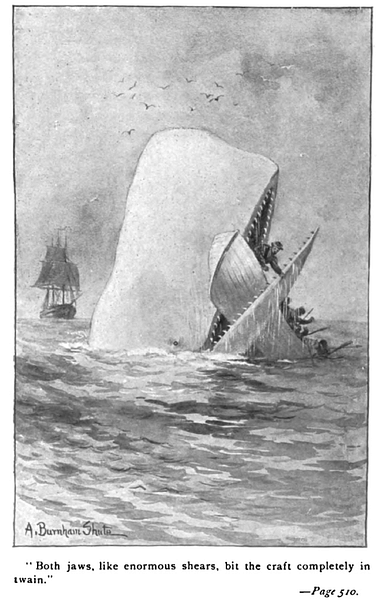
Melville Pens Moby Dick
By the time he began working on Moby Dick, Melville owned a farm near Pittsfield where he lived with his mother, sister, son Malcolm, and a pregnant wife – his son Stanwix would be born later that year. Two daughters would soon follow: Elizabeth in 1853 and Frances in 1854. December of 1850 found Melville still working on the finishing touches of Moby Dick. After completing the manuscript, he sent it to his publisher. Although he was feeling comfortable and content, Melville was still suffering financially; he owed money to Harpers for advancements on his earlier works, and in April of 1851, he was refused an advancement on Moby Dick. Early reviews of the new novel from such periodicals as Southern Quarterly Review were not promising. In the end, Moby Dick was disliked by both reviewers and the public. Robert Mead in his Literature of the American Nation wrote that while he admired the book's style it was too long — 600 plus pages — and weighed down with "abstruse" information on whales and whaling. Moby Dick would be Melville's last major novel.
Fifteen Minutes of Fame
Although Melville was already a "failing author who became increasing aware of it." (Delbanco, 141), he began to work on his next novel Pierre or The Ambiguities (1852). However, due to the poor sales of Moby Dick, the author was again refused an advancement. This new novel was then denounced as immoral. It was followed by three more unsuccessful novels which most critics agree completed the destruction of Melville's writing career. Delbanco wrote that "The clock had run out on Melville's fifteen minutes of fame" (6). The continued failure of his books left publishers reluctant to take a risk on so unpopular an author. In 1853, Melville switched from novels to short stories, writing for Harpers and Putnam. One short story about a Revolutionary exile Israel Potter was expanded into book-length, but this was another sales failure.
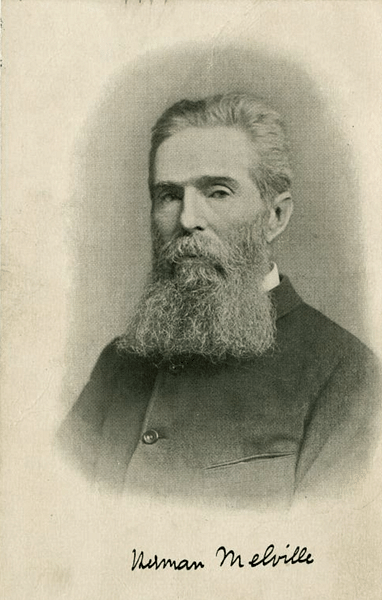
In 1856 Melville collected his Putnam stories into The Piazza Tales; two of the better-known tales therein are Bartleby the Scrivner and Benito Cereno. The Piazza Tales received good reviews but suffered poor sales. After a failed attempt at lecturing, Melville finally gave up writing, albeit temporarily, to work at the New York Customs House in 1866. After retiring from the Custom House, he returned to writing, but most of the work from this period went unpublished. His struggling career had not only brought financial distress but also mental, physical, and spiritual agony. Melville's 1853 novel Isle of the Cross was never published, probably destroyed. Melville's career as a novelist, which had lasted a mere decade, had ended.
Poetry & Death
From October to May of 1856 Melville traveled to the Holy Land – a trip financed by his wife's father Judge Shaw. Upon returning home, he lectured in the East and Midwest, unprofitably. Needing money, Melville was forced to sell part of his farm, he would later sell the remainder of the farm to his brother Allan. In October of 1863 with the farm sold, the Melville family moved to New York City. The following year Melville visited the Virginia battlefields. As a result, he wrote a book of poetry titled Battle-Pieces. Although it would be compared to Walt Whitman's Drum-Taps, it was reviewed but soon forgotten. After a lengthy illness, on 28 September 1891, Herman Melville died of a heart attack.

Melville's Legacy
Although relatively unappreciated in his own country, Melville's novels were better known and respected in England. Peter Coviello, in his introduction to Billy Budd, Bartleby and Other Stories, wrote that Melville was a "writer who made himself at home in a tremendous range of idioms and genres." (viii). To Coviello, reading Melville could be an "exercise of astonishment." Through reading his novels, even the lesser-known ones, a reader realizes that Melville could be critical as well as melancholy, comical. obscene, and satirical. (Coviello viii)
Over time, Melville's works would be rediscovered and his ability as an author would be appreciated. Many of Melville's contemporaries believed that American literature lacked its own identity, remaining in the shadow of the rich literary heritage of England, but this would change. Through the works of such authors as Ralph Waldo Emerson (1803-82), Henry David Thoreau (1817-62), Emily Dickinson (1830-86), and Melville, America gained its own literary recognition. Samuel E. Morison in his Oxford History of the American People wrote that every word Melville and Dickinson wrote, "whether published in their lifetime or later was a treasure." (558) One of Melville's signal contributions to our literature was to help destroy Old World forms and supplant them with something new and essentially American." (Delbanco 76)



